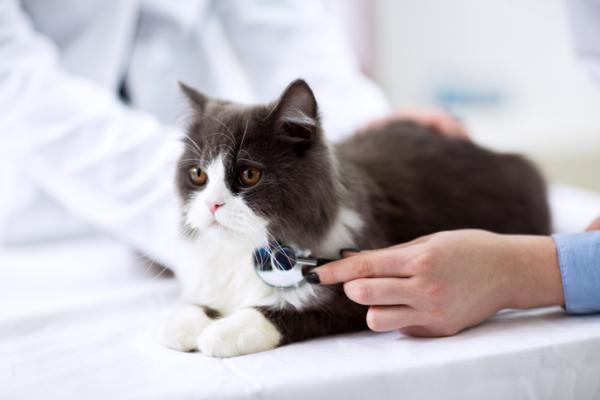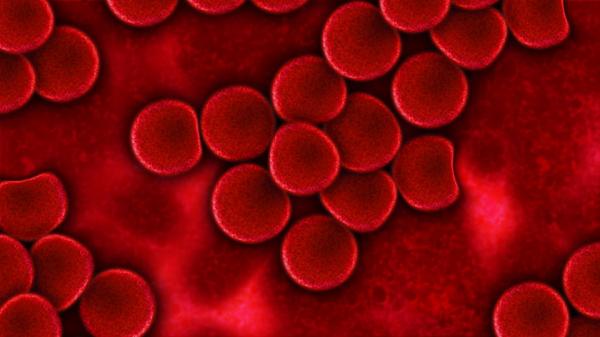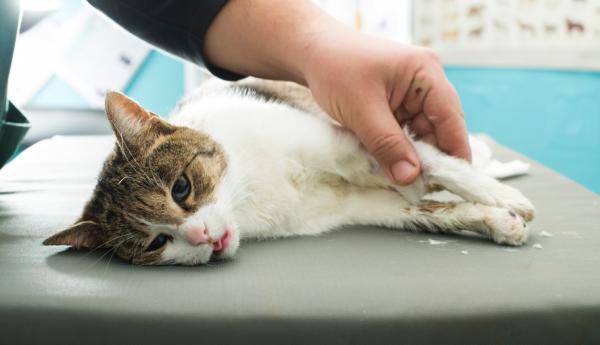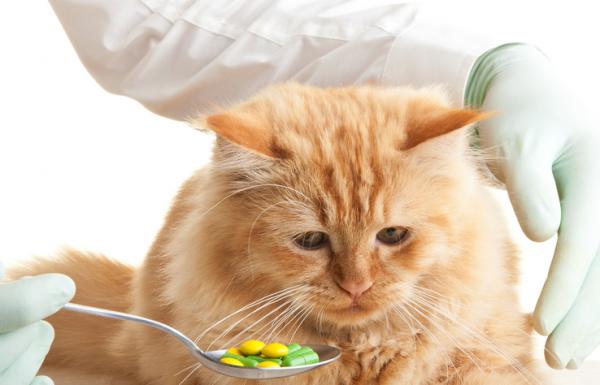Feline AIDS – Contagiousness, symptoms and treatment

If you have a cat, you know that these pets are very special. As pets, felines are faithful companions and if you want to take care of him as much as he does to you it is important that you know the diseases they can suffer to prevent and treat them.
AIDS in cats It is one of these diseases and along with feline leukemia, it is one of the most affecting the cat population. However, even if you do not have a vaccine, you can treat it effectively. Take care and consent to your pet, do not be scared and know in detail this disease, the forms of contagion, symptoms and treatment for AIDS in cats hand in hand
VIF – The feline immunodeficiency virus
Known by the acronym VIF, the immunodeficiency virus in cats is a lentivirus that only attacks cats. Although it is the same disease that affects humans, it is produced by a different virus, so what AIDS in cats does not spread to humans.
VIF directly attacks the immune system, destroying the T lymphocytes, which results in the animal being vulnerable to other diseases or less important infections, but with this condition can lead to death. It is a chronic disease and by affecting the cells of the immune system, it damages and destroys them causing a progressive deterioration of the immunological function of the cat.
Detected early, feline AIDS is a disease that can be controlled. An infected cat, which follows the appropriate treatment, can have a long and dignified life.

Transmission and infection of AIDS in cats
In order for our pet to get AIDS, it needs to be in contact with the saliva or blood of another infected cat. In principle, there is evidence that feline AIDS is transmitted through bites, so the stray cats are the most likely to carry the virus.
Unlike the disease in humans, it has not been proven that AIDS in cats is transmitted sexually and even if pets share a feeder or feeder. Of course, pregnant cats infected by FIV can transmit the disease to your puppies during pregnancy or lactation. It is not known if hematophagous parasites (fleas, ticks) can act as a means of transmitting this disease.
If your cat has always been at home you do not have to worry, but if it is not neutered and it goes out at night, it is best that you do it A blood test to check that everything is fine. Remember that cats are territorial which can cause occasional biting.
Symptoms of feline AIDS
As in humans, a cat infected with the AIDS virus can live for years without presenting characteristic symptoms or until the disease can be detected.
However, when the destruction of T-lymphocytes begins to diminish the capacity of the feline’s immune system, small bacteria and viruses that our pets face daily and without any problem, will begin to wreak havoc on the health of the animal and is then when the first symptoms may appear.
The symptoms of AIDS in cats Most common and that may appear months after infection are:
- Fever
- Loss of appetite
- Dull coat
- Gingivitis
- Stomatitis
- Recurrent infections
- Diarrhea
- Inflammation of connective tissue
- Progressive weight loss
- Abortions and fertility problems
- Mental deterioration
In general, the main symptom of a cat with AIDS is the appearance of recurrent diseases. So it’s important to watch the sudden onset of common diseases It’s hard for them to disappear or if your cat constantly falls on health problems that seem unimportant.

Diagnosis of AIDS in cats
The veterinarian will take into account all the symptoms that the cat presents as well as its clinical history but to verify the Feline immunodeficiency diagnosis may use several tests that will denote the presence of specific antibodies against IVF.
These tests can be done in the veterinary clinic although sometimes its reliability is not 100%, so it may be usual to repeat the test or use more complex tests in the laboratory, as well as using techniques to isolate the virus.
Treatment for cats with immunodeficiency
The best cure is preventionHowever, although the AIDS disease in cats does not have a vaccine, with proper care an infected pet can have a happy life.
To prevent your cat from becoming infected with the AIDS virus, remember to control your exits and avoid fights with street cats, as well as make a check at least once a year and more if you see that you come home with a scratch or bite. If this was not enough and your cat is infected you have to work in the Strengthening the defenses and the immune system.
There antimicrobial drugs that can help control infections or bacteria that attack the animal. It is important that we keep in mind that these treatments must be regular, because otherwise our feline friend may relapse with new infections. Also exist anti-inflammatory that will help control diseases such as gingivitis and stomatitis.
Apart from medications, feeding cats with AIDS should be special. It is recommended that the diet be of high caloric content, so that the cans and the wet food are a perfect ally to fight against the deterioration of the infected animal.
No treatment acts directly on the VIF in itself, what we can do to help our pet and give him a decent life, is to keep at bay all opportunistic diseases that can attack him while his immune system is weak.

What else should I know about feline AIDS?
– Life expectancy
It is important to bear in mind that the life expectancy of a cat with AIDS is not easy to predict, everything will depend on how your immune system responds to the attack of opportunistic diseases. When we speak of a dignified life, we mean that a pet with feline AIDS, can live with dignity having a series of minimal care. Even when it seems that your health picks up you should be very careful of aspects such as weight and fever.
– One of my cats has AIDS but the others do not
If the cats do not fight with each other there are no possibilities of contagion. Remember that feline AIDS is only transmitted through bites. However, since this is difficult to control, we recommend that you isolate the infected cat, just as if it were any other infectious disease.
– My cat has died of AIDS, is it safe to take a new one?
Without the carrier, FIV (Feline Immunodeficiency Virus) is very unstable and does not survive more than a few hours. In addition, feline AIDS is only transmitted through saliva and blood, and without an infected cat that bites, contagion to a new pet is very unlikely.
Anyway, as with any other infectious disease, we recommend some preventive measures:
- Disinfect or replace all belongings of the deceased cat
- Disinfect carpets and carpets
- Vaccinate the new pet against the most common infectious diseases
– Can a cat with AIDS infect me?
No, feline AIDS does not attack humans. A cat infected with AIDS will never be able to infect a human even when they bite him. Although it is the same disease, the VIF is not the same virus that infects humans, in this case we talk about HIV, which is the human immunodeficiency virus.

Cat care with immunodeficiency
If our cat has been diagnosed with feline immunodeficiency we can take several measures to try to make our pet enjoy a good quality of life:
- Offer good quality, nutritious and appetizing food
- Submit it to regular deworming, both internal and external
- Keep it inside the house to prevent it from catching other infections
- Continue with the stipulated vaccination program
- Offer homeopathy for cats as a preventive tool against secondary infections
Although it is possible that the cat with AIDS can live with some normality, prevent feline immunodeficiency It can be more complex, because to achieve this we must ensure that our cat does not take any contact with the outside.
This article is merely informative, in .com we do not have the faculty to prescribe veterinary treatments or make any kind of diagnosis. We invite you to take your pet to the veterinarian in case of any type of condition or discomfort.
If you want to read more articles similar to Feline AIDS – Contagiousness, symptoms and treatment, we recommend that you enter in our section of Infectious diseases.


